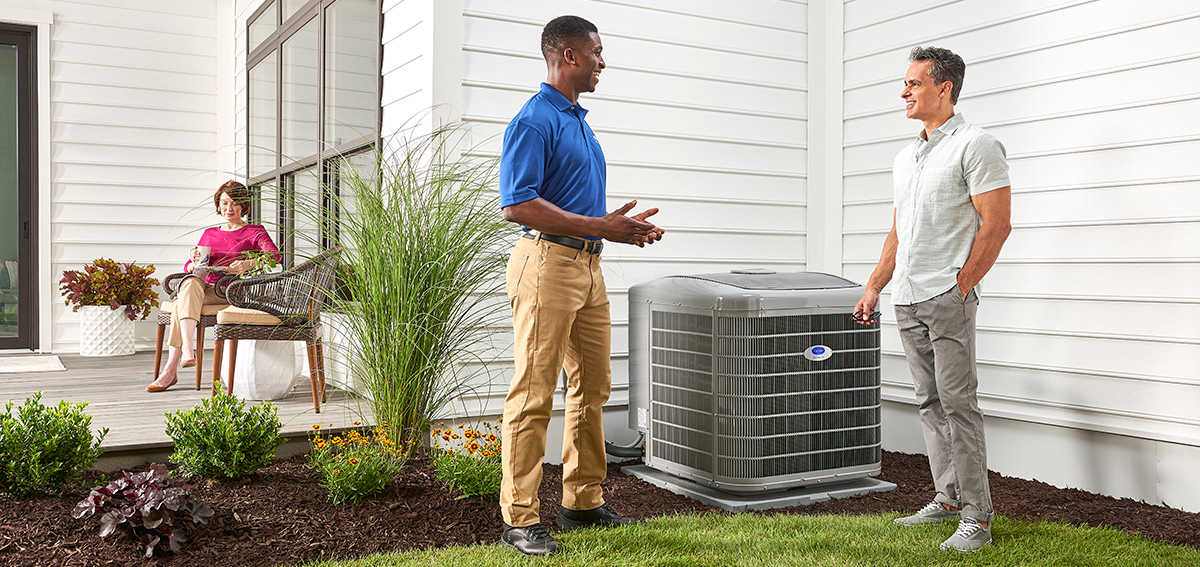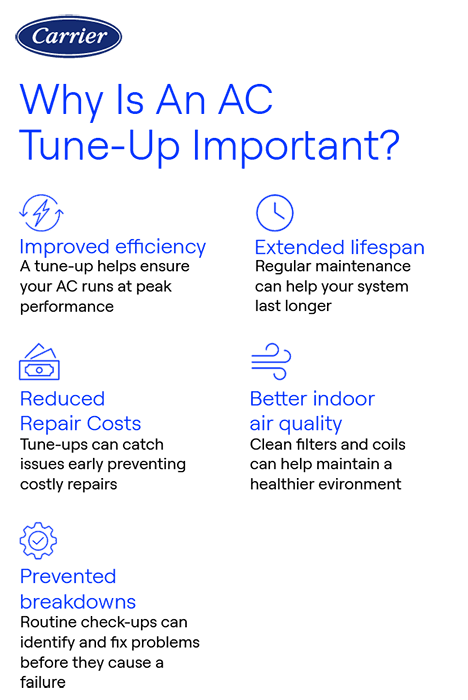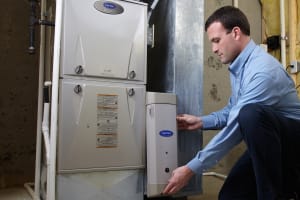Guide to AC Tune-Ups: Checklist, Costs & More

While air conditioners are developed and tested to run reliably for years, an annual AC tune up can be the key to keeping your HVAC system running at peak performance and helps to improve its life expectancy. Schedule your AC tune-up with a certified HVAC professional today to keep your system running efficiently.
WHAT IS AN AC TUNE-UP?
WHY IS AN AC TUNE-UP IMPORTANT?

Jennifer Fletcher, owner of Modern Air Solutions in Gurnee, IL said it’s important for homeowners to schedule a regular AC tune-up because annual service is preventative, not reactive.
“A professional inspection catches small issues before they turn into breakdowns, keeps the system running efficiently, and helps extend the life of the equipment — saving homeowners money, stress, and surprise repairs,” Fletcher said.
- Improved Efficiency: Tune-ups reduce wear and tear on your system by ensuring all components are clean and working properly, helping your AC use less energy.
- Extended Lifespan: Regular maintenance helps prevent premature breakdowns, allowing your air conditioner to last longer and perform better over time.
- Reduced Repair Costs: Catching small issues early during a tune-up can prevent costly repairs down the line.
- Better Indoor Air Quality: Cleaning and inspecting filters and ducts during tune-ups improves airflow and reduces dust, allergens, and contaminants in your home.
- Prevented Breakdowns: Routine tune-ups identify worn parts and potential failures, helping to avoid unexpected system shutdowns during peak usage.
In addition to regular AC tune-ups, it is also recommended to schedule an annual tune up for heating systems too. Properly maintaining both units of your heating and cooling system can help prolong the life of your entire system.
CHECKLIST: WHAT DOES AN AC TUNE UP INCLUDE?
During a routine maintenance service call, your dealer will likely evaluate air conditioner system performance in various modes of operation to determine its condition and evaluate whether repairs or adjustments are needed. Then they will shut off electrical power to execute a number of cleaning and inspection tasks.
Maintenance services will vary from contractor to contractor, but most HVAC dealers will perform similar tasks as part of a standard “clean and check” appointment.
- Replacing air filters: Dirty filters are replaced to improve airflow and indoor air quality.
- Checking ductwork for leaks or blockages: Ducts are inspected for damage or clogs that can reduce efficiency and comfort. Learn more about ductwork.
- Lubricating moving parts: Motors and fans are lubricated to minimize wear and reduce energy use.
- Calibrating or checking the thermostat: The thermostat is checked for accuracy and recalibrated if needed for optimal comfort control. Explore thermostats.
- Cleaning the evaporator coils and condenser coils: Coils are cleaned to ensure efficient heat transfer and cooling performance.
- Inspecting and cleaning the condensate drain line: The drain line is cleared to prevent clogs that can cause water damage or humidity issues.
- Checking and adjusting refrigerant levels: The technician ensures refrigerant is at the correct level for efficient operation and checks for leaks.
- Inspecting and tightening electrical connections: All electrical components are examined for safety and reliability.
- Cleaning and measuring the blower motor’s amperage: The blower motor is cleaned and its power draw is measured to ensure proper operation.
- Checking the run capacitor: The capacitor is tested to make sure the motor starts and runs correctly.
- Checking airflow: The technician verifies that airflow is balanced and unobstructed throughout the system.
- Testing electrical components: All safety switches and system controls are tested to confirm they’re functioning properly.
When the service is complete, many contractors will provide a written summary of the inspections and tests completed along with results and recommendations. In some cases, needed repairs may be able to be provided on the spot.
HOW MUCH DOES AN AC TUNE UP COST?
Factors Impacting AC Tune-Up Costs
Air conditioner tune-up costs will vary widely from dealer to dealer. A few factors that impact the price of a tune-up include:
- Type of unit: The kind of AC unit you have directly affects the cost of a tune-up. Central air systems typically require more in-depth service and inspections, leading to higher costs than ductless mini splits. The more complex the system, the more you may pay.
- Location: Where you live plays a major role in determining service pricing. In regions with higher labor costs—such as the West Coast or Northeast—you may pay more for a tune-up. In contrast, homeowners in the Midwest or Southern states may find tune-ups cheaper, particularly in suburban or rural areas where service demand and overhead are lower
- Contractor: Some HVAC companies will provide a more in-depth service with stated performance guarantees, while others might do a more basic service at a special rate to generate new business. Both approaches can yield the desired result of preparing your air conditioner to operate at its best during hot summer months, as long as the service is provided by a reputable HVAC contractor.
If summer is near and you haven't had an AC tuneup recently, a Carrier HVAC dealer can quickly and easily give you a quote for an AC tuneup and get you scheduled for your annual maintenance.
3 Ways to Save Money on Your AC Tune-Up
- Schedule before the busy season: Booking your tune-up in early spring or late fall—before extreme temperatures hit—can help you avoid peak pricing and long wait times. Many HVAC companies offer off-season discounts or promotional rates to fill slower schedules.
- Sign up for a maintenance plan: Joining an HVAC maintenance plan through a trusted dealer can provide ongoing service at a discounted rate. These plans often include tune-ups, priority scheduling, and reduced repair fees, making them a cost-effective long-term option.
- Look for coupons: Many HVAC companies offer seasonal rebates, coupons, or promotional deals for AC tune-ups. Checking their websites or signing up for email alerts can help you take advantage of limited-time savings.
SCHEDULE AN AC TUNE-UP WITH A LOCAL DEALER
Frequently Asked Questions About AC Tune Ups
- Heating and cooling bill is higher than expected
- Air flow from cooling registers (vents) is less than normal
- Indoor temperatures higher than normal/AC not keeping up
- AC constantly running or turning on and off frequently
- Higher than normal humidity inside
- Clean the area around the AC unit: Remove any debris, leaves, or clutter around both the indoor and outdoor units to allow easy access.
- Check the filters: Inspect and, if necessary, replace dirty filters to improve airflow and system performance.
- List out any concerns: Make note of unusual noises, inconsistent temperatures, or recent spikes in energy bills to share with your technician.
- Ensure pets are secure: Keep pets safely out of the work area to help the appointment go smoothly.
- Clear space around the thermostat: Make sure the technician can easily access the thermostat for calibration and testing.
Learn More About HVAC Tune-Ups
- Air Conditioner Not Cooling
- Find out how to Troubleshoot an Air Conditioner
- Discover causes of an AC short cycling
- Need help with AC Fan Not Working?
- Read about Air Conditioner Coil Cleaning
- How to fix a Clogged AC Drain Line




